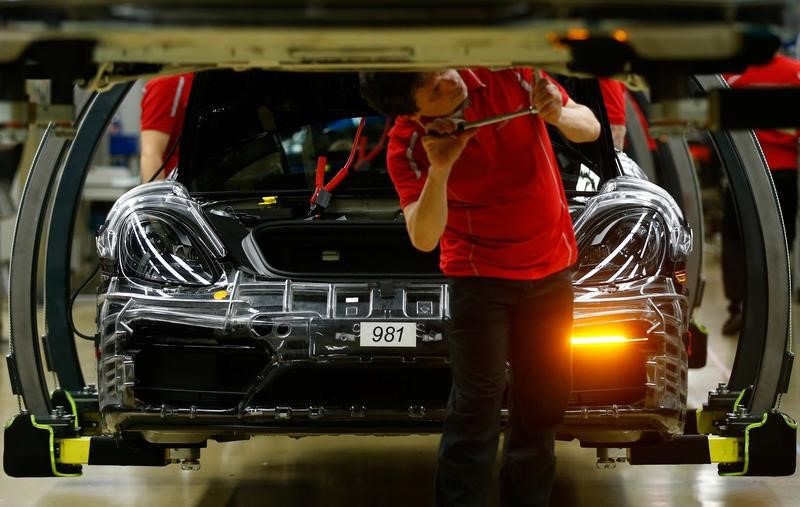By Michael Nienaber
BERLIN (Reuters) - German industrial orders plunged due to weak demand from domestic and euro zone clients in April, posting their fourth straight drop on the month, as growing uncertainty about a global trade war led companies to scale back investment plans.
The weaker-than-expected data, published by the Federal Statistics Office on Thursday, suggested that the upswing in Europe's largest economy could further lose momentum after its quarterly growth rate halved at the beginning of the year.
Contracts for goods 'Made in Germany' fell by 2.5 percent on the month in April after a downwardly revised drop of 1.1 percent the previous month, the data showed.
The reading significantly undershot a Reuters poll of analysts, who had predicted a 0.8 percent rise. It was the first time since the financial crisis in 2008 that German industrial orders have fallen for four months in a row.
VP Bank economist Thomas Gitzel pointed to rising uncertainty sparked by U.S. President Donald Trump's decision in March to impose hefty tariffs on steel and aluminum imports.
"This has probably unsettled companies in the euro zone and with it slowed demand for capital goods," Gitzel added.
German Economy Minister Peter Altmaier warned against the growing tide of protectionism, saying that tariffs and trade barriers helped nobody. But he remained bullish on the prospects for Europe's powerhosue.
"There is no rule that says this upswing has to be over soon," he told a conference in Berlin on Thursday. If the current boom continues into next year, it will be Germany's longest upturn in more than half a century.
Investors fear the U.S. could impose tariffs of up to 25 percent on the same "national security" grounds used to impose the steel and aluminum duties - a move that would particularly hit Germany's important automobile industry.
A sector breakdown of the industrial orders data showed demand for capital and consumer goods fell the most in April, driven by especially weak orders from other euro zone countries.
Overall, orders from domestic clients were down 4.8 percent while foreign demand edged down 0.8 percent, the data showed.
LOSS OF MOMENTUM
DIHK economist Sophia Krietenbrink said the unexpected drop in orders could signal a loss of economic momentum despite the fact that order backlogs were still high.
"Trade conflicts, in particular, are causing considerable uncertainty from outside," she said.
The release followed a string of strong economic data that included retail sales posting a bigger-than-expected jump in April, unemployment reaching a record low in May and business morale steadying despite the threat of a global trade war.
Germany's VDMA industry association said on Wednesday that engineering orders had jumped 12 percent in April compared to a year before, with surging domestic demand offsetting a drop in contracts from euro zone partners.
The German economy grew 0.3 percent on the quarter in the first three months of the year after 0.6 percent at the end of 2017. So far, economists had predicted up to 0.5 percent growth in the second quarter.
But Commerzbank (DE:CBKG) analyst Ralph Solveen said the weak orders data now pointed to the Germany economy growing only at a moderate pace also in the April-June period.

For 2018 as a whole, the government forecasts 2.3 percent growth.